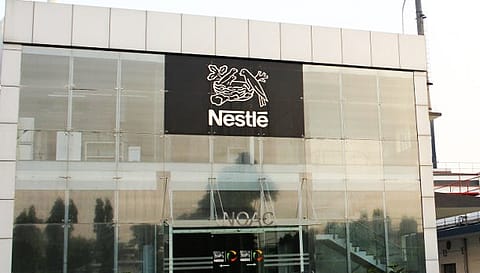Nestle Q4 profit drops 20% to ₹387 cr on one-time loss
The dip in profit despite robust revenue figures was caused by the reformed pension scheme for certain employees of the company.

FMCG major Nestle India reported a 20% decline in net profit for the three months ended December 31, 2021 at ₹386.66 crore. Compared to the net profit of ₹483.31 crore reported in the year-ago period, the dip in the bottomline came on the back of an exceptional item in the form of amended pension scheme for certain employees.
Nestle India clocked ₹3,559.78 crore in domestic sales and ₹146.42 crore in export sales during the December quarter of 2021, taking the total sales to ₹3,706.20 crore. In the corresponding quarter, the company had reported domestic sales at ₹3,260.70 crore and export sales at ₹156.82 crore, taking total sales to ₹3,417.52 crore.
Total revenue from operations for the quarter under review stood at ₹3,739.32 crore, compared to ₹3,432.58 crore a year ago. Total expenses grew to ₹3,022.97 crore during the period, as opposed to ₹2,793.01 crore in the year-ago period.
“We continue to witness high inflation in our key raw and packaging materials, where many are at 10-year highs. However, we remain confident of our ability and competencies and will continue to make all efforts towards cost optimization and seeking systematic efficiencies to mitigate the impact,” said chairman and managing director Suresh Narayanan.
For the full calendar year 2021 – Nestle follows calendar year financial reporting – the company reported net profit of ₹2,144.86 crore, as against ₹2,082.43 crore in 2020. Sales from products stood at ₹14,633.72 crore, while revenue from operations was pegged at ₹14,709.41 crore. The company generated ₹2,999 crore in cash from operations. Total expenses expanded to ₹ 11,709.25 crore from ₹10,683.09 crore.
The dip in profit despite robust revenue figures was caused by exceptional items reported in December. The Defined Benefit Pension Scheme for certain employees was amended and replaced by ‘Future Ready Plan’, effective December 1, 2021.
This new pension scheme is a combination of amended Defined Benefit Pension Scheme for past period of service and a Defined Contribution Scheme for future service. The defined benefit obligation for past period of service as per the ‘Future Ready Plan’ has been determined based on actuarial valuation carried out by an independent actuary basis the amended plan and has been frozen, Nestle said in its filing to the exchanges.
Recommended Stories
“The frozen amount as determined under the ‘Future Ready Plan’ has been invested by the company in an appropriate investment product of an insurance company. The accumulated investment balance shall be in future utilised to purchase pension annuities from the insurance company for the employees as per the `Future Ready Plan’. The investment so made is recognised as having ‘reimbursement rights’ as per Ind AS 19 Employee Benefits,” Nestle further said.
At the end of 2021, Nestle saw the e-commerce channel register strong acceleration on the back of convenience and pandemic driven consumer behaviour. The company said it fully leveraged the trend through meaningful shopper insights, data analytics, speed, sharp communication and customisation for the channel.
Organised trade witnessed resurgence and good revenue growth, despite the impact of the second wave, Nestle India further added. While out of home (OOH) channels were impacted by the second wave of Covid-19 infections, “Nestle Professional Business promptly initiated revenue acceleration and business recovery measures through building and scaling up opportunities, coupled with channel-led initiatives (focus on delivery /cloud kitchen) to bounce back faster”.
Nestle expanded its product offerings across the globe to drive growth, especially its Maggi range in both ethnic and mainstream channels in the U.K. and Australia.
(INR CR)
“Price outlook for key categories, like edible oils, coffee, wheat, fuel remains firm to bullish while costs of packaging materials continue to increase amid supply constraints, rising fuel and transportation costs. Input prices are expected to be on bullish trend both globally and to some extent locally,” Nestle said.
“Fresh milk prices are expected to remain firm with continued increase in demand and rise in feed costs to farmers. In an environment of raw and packaging material inflation, we continue to keenly look for opportunities for cost optimization and efficiencies,” it added.
The board of directors of Nestle India also recommended a final dividend of ₹65 per equity share at a face value ₹10 per equity share, amounting to ₹626.70 crore. With this, the total dividend for 2021 aggregates to ₹200 per equity share, including first interim dividend of ₹25 per equity share paid on May 19, 2021, and second interim dividend of ₹110 per equity share paid on November 16, 2021.
The final dividend is subject to approval by the shareholders at the ensuing annual general meeting of the company and therefore has not been recognised as a liability, Nestle mentioned.
At the end of today’s session, the Nestle India stock ended 159.80 points, or 0.88%, lower at ₹18,084.55 as it missed street profit estimates.